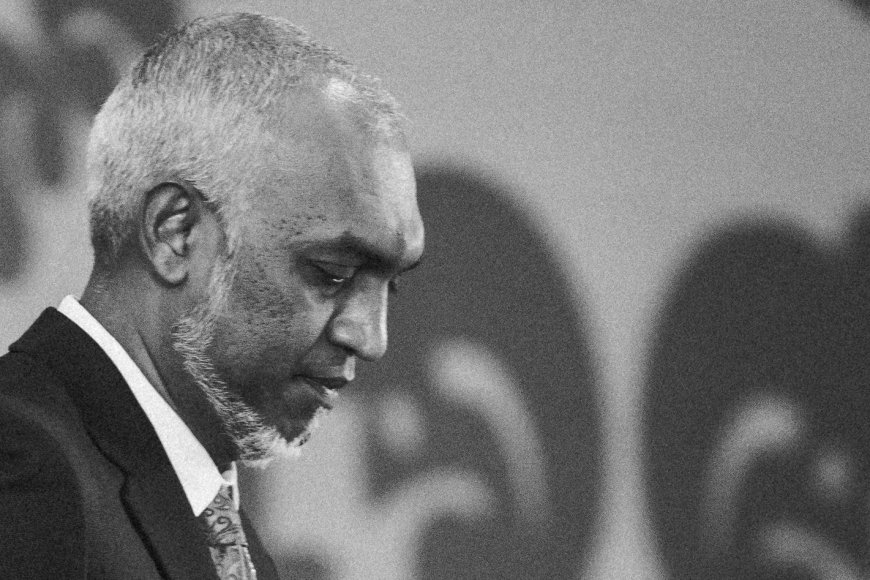OPINION: Dr. Muizzu, A Tyrant’s Rule

Setting the Stage: Betrayal and Centralization
Muizzu’s rise to power in November 2023 was engineered by the very opposition machinery that once supported him most notably, former president Abdulla Yameen. Yet within weeks of inauguration, Muizzu moved swiftly to marginalize his benefactor, stripping Yameen of influence within their shared party and sidelining his loyalists from power corridors. Yameen’s abrupt departure and formation of a new party underscored a merciless calculus: loyalty and alliances were expendable if they posed a threat to Muizzu’s unchallenged rule.
Simultaneously, Muizzu declared elected Atoll Councils, pillars of local representation as “useless,” launching a stealthy campaign to abolish them. Constitutional amendments and legislation stripped these councils of financial autonomy and legislative power. In their place, Atoll Chiefs would be centrally appointed, and elected bodies made vulnerable to dissolution by a government controlled authority.
Threads of Corruption: From Targets to Tainted Projects
In a rare moment of accountability, Muizzu’s government arrested Immigration Chief Mohamed Shamman Waheed in March 2025 over allegations of accepting bribes exceeding MVR 500,000 to release a detainee. While swift action against Shamman appeared commendable, critics saw it as selective justice a sacrificial lamb used to portray anti-corruption fervor, while corruption at higher levels remained unscathed. His trial, now pending, highlights an uneven rule of law that shields political insiders while punishing peripheral figures.
Additionally, The Housing Development Corporation (HDC), a state run agency presumed to deliver housing, was exposed as rotten to its core in late 2024. A leaked letter from former chairman Ahmed Zuhoor detailed a culture of bribes, flat reallocations, and conflict of interest alleging that the Managing Director siphoned homes meant for citizens to cronies, and even implicated himself, including in elevator procurement and missing funds. Notably, the media leak asserted Muizzu remained silent for five months despite being informed a glaring statement on his tolerance for graft.
As the HDC scandal broke, a suspicious fire engulfed the Housing Ministry’s offices, incinerating crucial documents and servers. Though officially deemed “unclear,” the timing suggested deliberate arson possibly to erase evidence of corruption. The incident fed speculation of a sophisticated cover-up engineered to protect corrupt networks within Muizzu’s orbit .
Later on, Muizzu unveiled the Maldives Development Bank as a flagship economic initiative, yet months later the institution remained dormant despite consuming MVR 4 million in public funds. Dubbed a “white elephant,” the bank’s existence seemed more political theater than financial catalyst, showcasing mismanagement and misdirection of public resources.
Up came the the largest land reclamation project in Maldivian history, the Ras Malé initiative collapsed under murky circumstances. Initially promising 1,153 hectares within eight months without taxpayer expense, the project stalled after contracting failures and engineering miscalculations. Eventually, MVR 77 million in public funds had to be quietly injected abandoning Muizzu’s no state funds pledge. Today, progress remains negligible, and the grandiose vision lies in tatters a cautionary tale of political image trumping practical results.
Shielding Allies & Diplomatic Embarrassment
In April 2025, public fury erupted when young Mariyam Yumnu Rasheed fell or possibly was pushed from a high-rise. The apartment belonged to Transport Minister Ameen, yet authorities initially ruled out foul play, released intimate details about Yumnu, and withheld identities of party attendees. Only after mass protests did the government suspend low-level officials and eventually arrest one suspect highlighting how justice is suspended when the politically powerful are implicated. Investigations concluded “no foul play,” but transparency remained absent, deepening public distrust.
Next, Muizzu’s administration courted a man presented as a Saudi royal complete with ceremonial invitations and media pomp. It was later exposed that he had no official title or governmental role. The Saudi government lodged a formal protest, and Muizzu’s Foreign Ministry tried to erase public records of the visit. Questions remain: Who orchestrated this deception, and to what end? It was not only a diplomatic embarrassment, but a stain on Muizzu’s judgment and legitimacy in international diplomacy.
Institutional Capture: Courts, Press, and Power
A defining moment came when Muizzu’s supermajority parliament impeached two Supreme Court judges in mid-2025 after they opposed a constitutional amendment enabling party led MP disqualifications. Justice Husnu Al Suood resigned in protest, denouncing political interference and calling on the UN to investigate. Evidently, the judiciary once viewed as a safeguard is being dismantled to prevent challenges to Muizzu’s agenda .
While, in August 2025, Muizzu’s regime introduced a sweeping Media and Broadcasting Regulation Bill. It dissolves independent media regulators, replacing them with a state controlled commission with sweeping powers to fine, suspend, or shut down outlets using vague standards like “fake news” or threats to national unity. Human rights groups like the CPJ have condemned it as a pretext to curb critical journalism, marking another ominous step in Muizzu’s erosion of democratic norms.
Conclusion: Pattern of Autocracy
The arc of Muizzu’s presidency traces a path from political pragmatism to entrenched authoritarianism. His betrayal of key allies, tolerance for corruption, manipulation of institutions, and suppression of dissent collectively form a portrait of a ruler willing to sacrifice democratic principles for the consolidation of power.
These events aren’t isolated; they form a consistent pattern of deficit over delivery, opacity over accountability, and fear over freedom. For the Maldives a nation that fought long for self-rule and democratic ideals Muizzu’s ascent signals a sobering regression.
If this trajectory continues, Maldives may soon be defined less by its turquoise lagoons than by the shadows of tyranny and institutional decay. This editorial’s plea: it’s time to shine light on corruption, defend independent institutions, and reclaim a future that isn’t dictated by fear or control but by transparency, justice, and true democracy.
What's Your Reaction?
 Like
2
Like
2
 Dislike
0
Dislike
0
 Love
1
Love
1
 Funny
0
Funny
0









